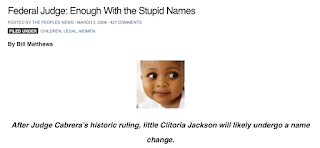Federal Judge: Enough With the Stupid Names
https://thepeoplesnews.wordpress.com/2008/03/02/federal-judge-enough-with-the-stupid-names/
(DETROIT) In a decision that’s expected to send shockwaves through the African-American community—and yet, give much relief to teachers everywhere—a federal judge ruled today that black women no longer have independent naming rights for their children. Too many black children—and many adults—bear names that border on not even being words, he said.
“I am simply tired of these ridiculous names black women are giving their children,” said U.S. Federal Judge Ryan Cabrera before rendering his decision. “Someone had to put a stop to it.”
The rule applies to all black women, but Cabrera singled out impoverished mothers.
“They are the worst perpetrators,” he said. “They put in apostrophes where none are needed. They think a ‘Q’ is a must. There was a time when Shaniqua and Tawanda were names you dreaded. Now, if you’re a black girl, you hope you get a name as sensible as one of those.”
Few stepped forward to defend black women—and black women themselves seemed relieved.
“It’s so hard to keep coming up with something unique,” said Uneeqqi Jenkins, 22, an African-American mother of seven who survives on public assistance. Her children are named Daryl, Q’Antity, Uhlleejsha, Cray-Ig, Fellisittee, Tay’Sh’awn and Day’Shawndra.
Beginning in one week, at least three white people must agree with the name before a black mother can name her child.
“Hopefully we can see a lot more black children with sensible names like Jake and Connor,” Cabrera said.
His ruling stemmed from a lawsuit brought by a 13-year-old girl whose mother created her name using Incan hieroglyphics.
“She said it would make me stand out,” said the girl, whose name can’t be reproduced by The Peoples News’ technology. “But it’s really just stupid.”
The National Association of Elementary School Teachers celebrated Cabrera’s decision.
“Oh my God, the first day of school you’d be standing there sweating, looking at the list of names wondering ‘How do I pronounce Q’J’Q’Sha.’?” said Joyce Harmon, NAEST spokeswoman. “Is this even English?”
The practice of giving black children outlandish names began in the 1960s, when blacks were getting in touch with their African roots, said historian Corlione Vest. But even he admits it got out of hand.
“I have a niece who’s six. I’m embarrassed to say I can’t even pronounce her name,” said Vest, a professor at Princeton University. “Whenever I want to talk to her, I just wait until she looks at me and then I wave her over.”
Cabrera’s ruling exempted black men because so few of them are actually involved in their children’s lives.
Note: This article is satire, brought to you by the creative minds at The Peoples News. It’s not real, but we hope it made you think. Couldn't you tell? The judge's name was Ryan



Comments
Post a Comment